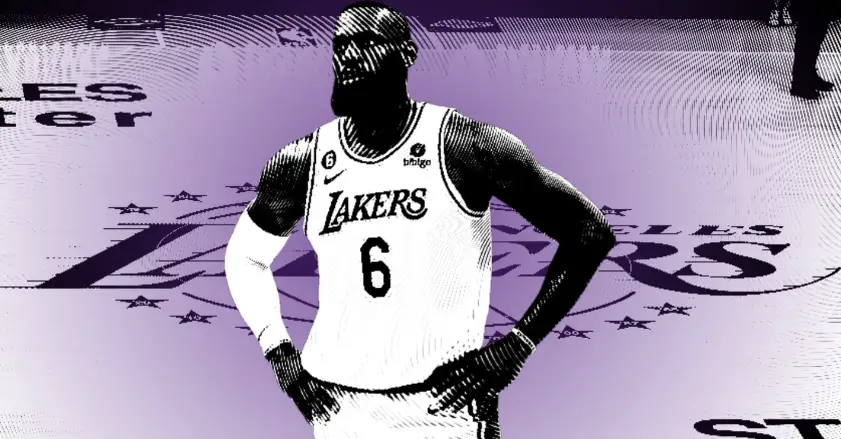The NBA has been a stage for continuous evolution, showcasing some of the most transformative players in sports history. In this unfolding drama, LeBron James stands as an intriguing protagonist whose role has dramatically evolved over the years. His journey from a high-scoring small forward during his early years with the Cleveland Cavaliers and Miami Heat to an efficient and versatile playmaker has captivated fans and analysts alike.
This transformation is particularly noteworthy in his tenure with the Los Angeles Lakers. While his evolved playmaking role has unquestionably benefited the team, culminating in a 2020 NBA championship, it also poses significant challenges. This dual-edged sword raises important questions about team construction, player longevity, and the Lakers’ prospects.
From Scorer to Facilitator: The Cleveland and Miami Years
During LeBron James’ early years with the Cavaliers and the Heat, he was predominantly known as an explosive scorer with unmatched versatility. He dazzled the NBA with his athletic prowess, accumulating accolades that included multiple Most Valuable Player (MVP) awards. After failing to win a title in Cleveland, he went to Miami, leading them to back-to-back championships in 2012 and 2013. Subtle hints, though, of his future as a facilitator were also apparent. In his return stint with the Cavaliers, LeBron began to mold his game around a more balanced approach, blending his scoring with playmaking.
Assisted by standout talents like Kyrie Irving and Kevin Love, James transitioned from a score-first player to a more well-rounded superstar. His evolution as a facilitator culminated in bringing a championship home to Cleveland in 2016, thus setting the stage for his future role with the Lakers.
The Lakers Era: LeBron as the Primary Playmaker
When LeBron James transitioned to the Lakers, the team’s existing roster construction nudged him into a more pronounced role as the primary playmaker. Anthony Davis, the Lakers’ other marquee player, excels as a finisher but lacks the skill set to be a primary creator. Consequently, LeBron assumed the dual role of scorer and facilitator, effectively becoming the team’s primary ball-handler and distributor.
This shift in responsibilities led to reorganizing the Lakers’ offensive schemes, emphasizing LeBron’s court vision and passing abilities. The results were immediate, culminating in an NBA Championship in 2020.
The Conundrum: Lack of a Secondary Playmaker
While LeBron James’ transformation into the primary playmaker has been largely successful, it exposed a glaring vulnerability in the Lakers’ roster— the lack of a secondary ball-handler. Attempts to fill this role with players like Dennis Schröder and Talen Horton-Tucker were met with limited success, leading to an overreliance on LeBron. This heightened usage had repercussions, leading to increased minutes and wear and tear on the veteran superstar. Injuries severely curtailed his 2021 season, and the team failed to make the playoffs.
The Lakers recognized this gap and acquired D’Angelo Russell last season, providing a much-needed secondary ball-handler. Russell’s presence alleviates some of the playmaking burden off LeBron, offering a potential solution to a problem that has plagued the team. Integrating a new ball-handler, however, raises questions about chemistry and lineup optimization, a challenge the Lakers must navigate carefully.
What’s Next for the Lakers?
As the team gears up for the upcoming season, they find themselves at a critical juncture. The immediate challenge lies in balancing James’ dynamic yet evolving skill set with the need for a secondary playmaker. Acquiring Russell offers some relief, but it also injects new variables that require careful calibration. Given LeBron’s advancing age and potential looming retirement, the preservation of his longevity while still maximizing his impact is paramount.
The Lakers’ upcoming regular season becomes even more pivotal as a testing ground for new lineups, strategies, and rotations, all aimed at solving the playmaking dilemma. How well they adapt could significantly influence their playoff run and, ultimately, LeBron’s enduring legacy with the team.
Conclusion
The narrative of LeBron James’ career, from his scoring dominance in Cleveland and Miami to his role as the Lakers’ main facilitator, encapsulates the evolving nature of the NBA. His transition to primary playmaker was both a testament to his versatility and a necessity given the Lakers’ roster. His dominance on the court has helped the Lakers’ chances while derailing others, like the Sacramento Kings odds.
As the Lakers move forward, their ability to solve this playmaking puzzle will not only impact their immediate championship aspirations but also shape the final chapters of LeBron’s illustrious career. This duality makes the upcoming season one of the most compelling storylines in the league.


